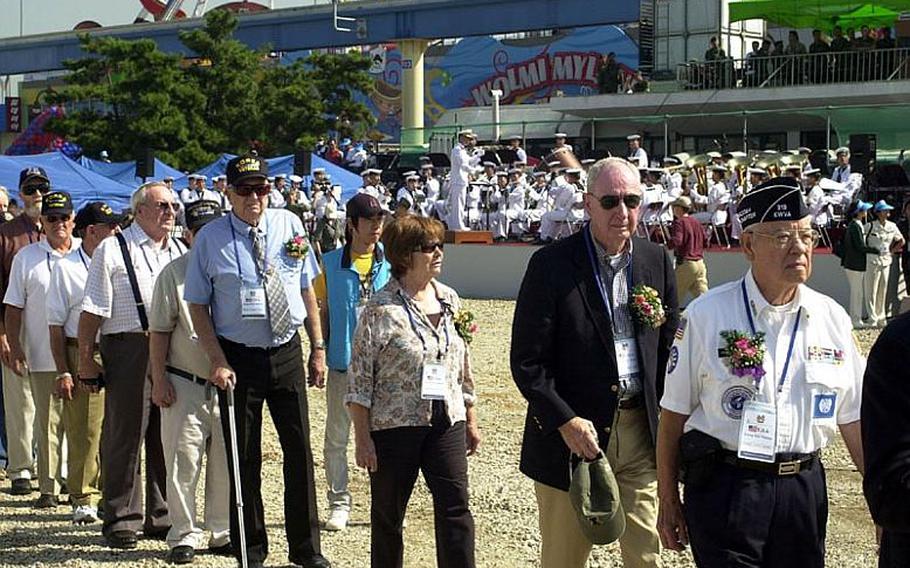
Korean War veterans file Wednesday into ceremonies marking the 60th anniversary of the Inchon Landing, a surprise attack that was a turning point in the Korean War. The event was held on Wolmi Island in South Korea, one of the places allied forces came ashore during the operation. (Jon Rabiroff/Stars and Stripes)
INCHEON, South Korea — At a site where U.S. forces stormed the beaches 60 years ago and turned the tide of the Korean War, current U.S. Forces Korea commander Gen. Walter Sharp had some terse words Wednesday for North Korea.
Straying from his prepared remarks to a gathering of about 2,000 people to watch and participate in a re-enactment of the landing at Inchon, Sharp called on the nation that nearly overran South Korea in 1950 and still threatens it today “to immediately stop all future provocations and immediately denuclearize.”
“As the recent North Korean attack on the Cheonan reminds us,” he said, directing comments to veterans of the war, “we must always remain strong and vigilant to ensure what you brave men and women – and those who made the ultimate sacrifice — fought for will be protected for the future generations.”
Sharp was referring to North Korea’s alleged role in the March 26 sinking of a South Korean warship in the Yellow Sea, known as the West Sea by Koreans. The torpedoing killed 46 sailors and further strained long-simmering relations between the two Koreas.
The North and South are still technically at war, since hostilities in the 1950-53 conflict were ended by armistice, and no formal peace treaty was ever signed.
Gen. Douglas MacArthur’s Inchon landing is widely considered to be the turning point of the war. The invasion 60 years ago Wednesday split North Korean forces and their supply lines that had extended deep into the southern part of the Korean peninsula. Soon after, allied forces liberated Seoul and pushed into North Korea, halted by a massive intervention of communist Chinese troops aiding the North.
William Cheek, a U.S. Marine corporal and an anti-tank assault unit leader on the day of the Inchon invasion, told Wednesday’s gathering that the assault “completely surprised the North Koreans and changed their game plan and … it gave a huge boost to the morale of the South Koreans — military and civilians alike.”
Sharp said the attack is “considered to be one of the most successful examples of a joint and multinational operation in all of history … [and] paved the way for the Republic of Korea to become a democracy and one of the great economic successes of our time.”
Wednesday’s ceremony on the shores of Wolmi Island, near the city now spelled Incheon, also featured a battle re-enactment that included explosions; an array of land, sea and air equipment; and dozens of U.S. Marines and other personnel climbing over a sea wall and massing in front of the crowd.
That was followed by Marine Capt. Michael Borneo, the senior-ranking officer for the re-enactment landing force, striding from the beach dressed as MacArthur, replete with the general’s iconic sunglasses and corncob pipe.
Borneo said he appreciates the bravado and execution involved in the original landing.
“You can see here the tide drops 30 feet between low tide and high tide,” he said, gesturing toward the Yellow Sea. “Amphibious landings are very difficult in and of themselves. In this environment — this close to North Korea, this close to Seoul — it was a very ballsy move, and it paid off.”